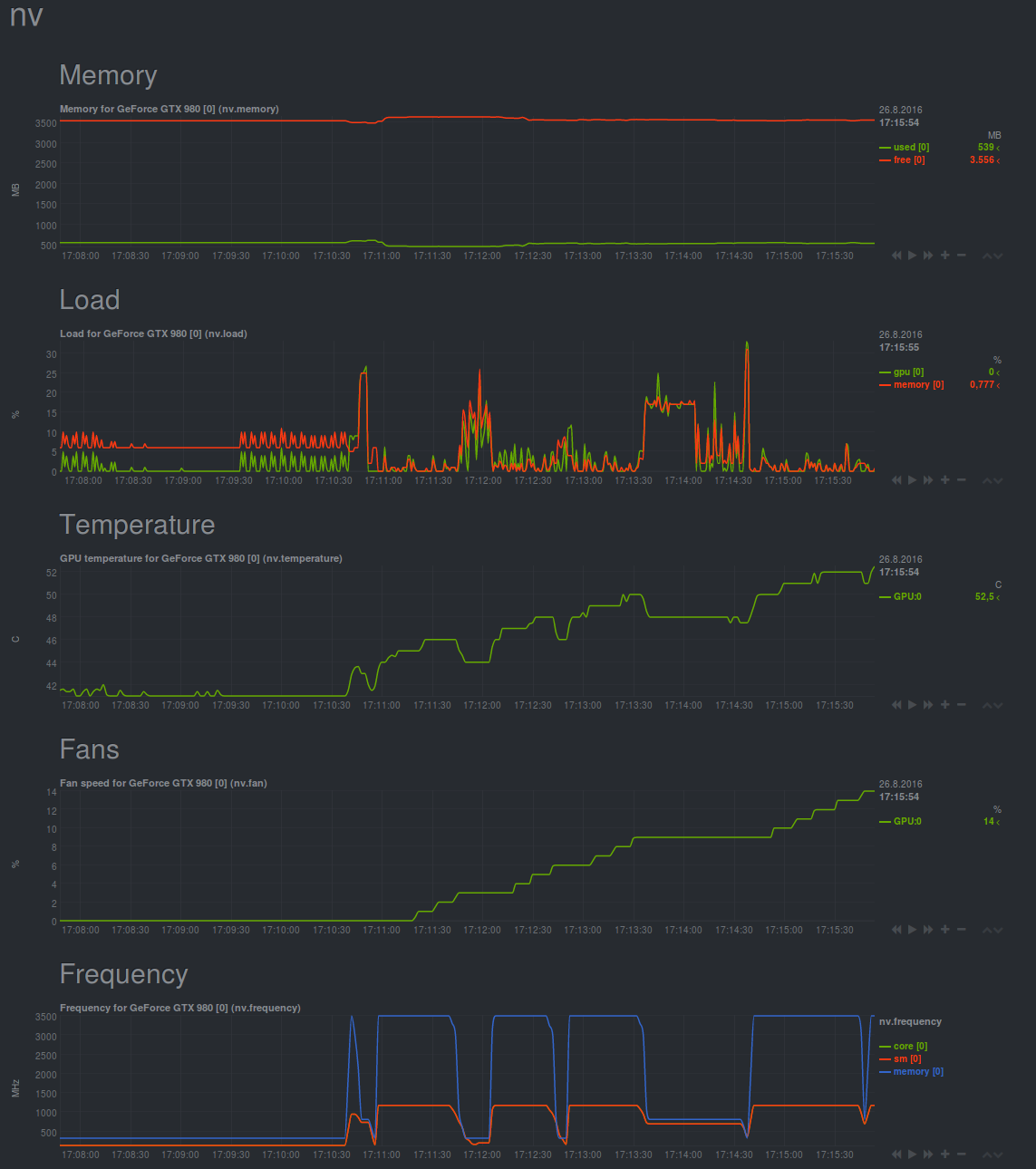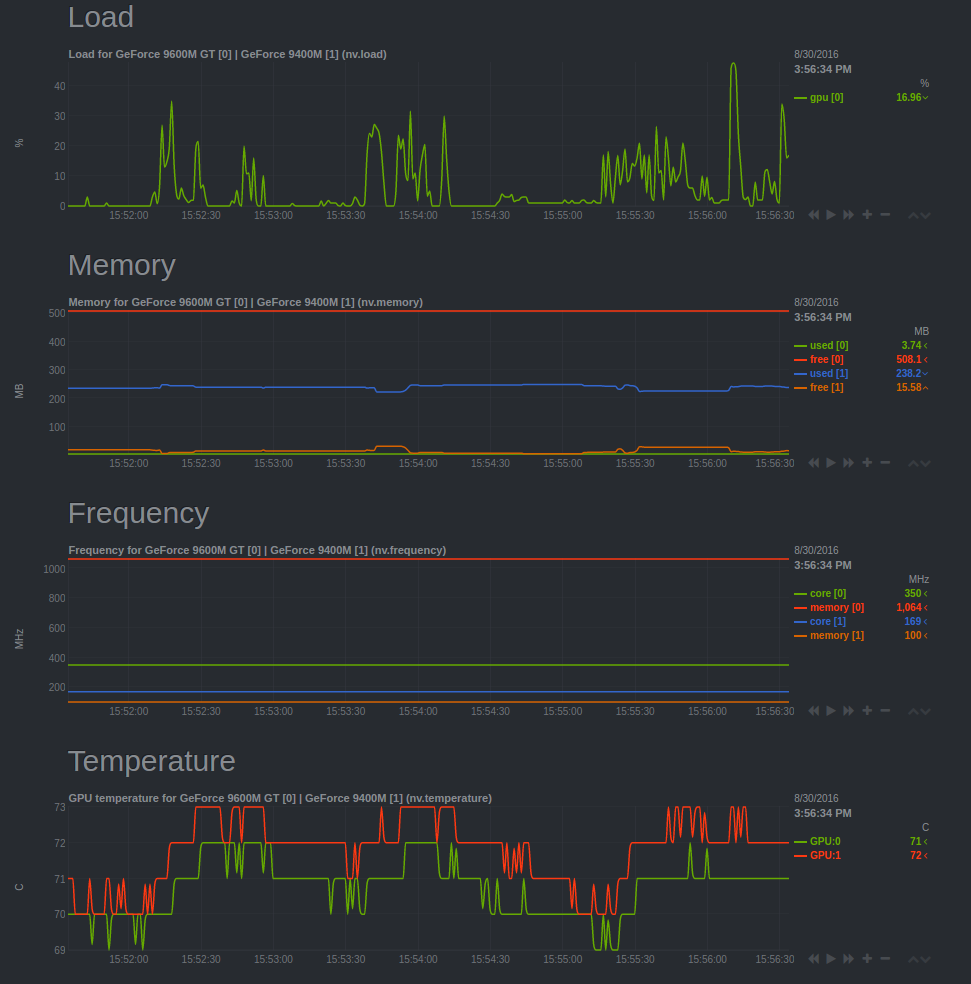README
Overview
- About
- Requirements
- Installation
- Options
- Charts
- Known Bugs/Issues
- FAQ
- License
- Version History
- Contact
- Screenshots
About
NetData plugin that polls Nvidia GPU data.

Requirements
- Nvidia driver installed (this plugin uses the NVML library)
- nvidia-ml-py Python package (Python NVML wrapper)
Installation
General
The path to the NetData installation refered to in this readme is /usr/libexec/netdata/. For some NetData installations the path may vary, e.g. /usr/lib/x86_64-linux-gnu/netdata.
Install the nvidia-ml-py Python package via pip install nvidia-ml-py or copy the pynvml.py file from the "nvidia-ml-py" package (https://pypi.python.org/pypi/nvidia-ml-py) to /usr/libexec/netdata/python.d/python_modules/.
IMPORTANT: Version 7.352.0 of the nvidia-ml-py package does not work with Python >=3.2 -> see known bugs section of this readme.
With default NetData installation copy the nv.chart.py script to /usr/libexec/netdata/python.d/ and the nv.conf config file to /etc/netdata/python.d/.
Then restart NetData to activate the plugin.
To disable the nv plugin, edit /etc/netdata/python.d.conf and add nv: no.
Installation Example
Example for standard NetData installation under Ubuntu, working with Python >=2.6 and >=3.2:
cd /tmp/
git clone https://github.com/coraxx/netdata_nv_plugin --depth 1
sudo cp netdata_nv_plugin/nv.chart.py /usr/libexec/netdata/python.d/
sudo cp netdata_nv_plugin/python_modules/pynvml.py /usr/libexec/netdata/python.d/python_modules/
sudo cp netdata_nv_plugin/nv.conf /etc/netdata/python.d/Options
Options are set in the nv.conf file.
Memory Clock Factor
Set nvMemFactor: 2 in the nv.conf file if you want to display "the real clock speed". This is due to DDR RAM. Default is 1.
Legacy Mode
With older GPUs like my Nvidia GeForce 9600m gt, the load and clock frequencies cannot be read by the NVML lib. Only temperature and memory usage is displayed.
Set legacy: True in the nv.conf file to poll GPU and memory load/frequency via the nvidia-settings application (also installed with the Nvidia driver).
Tested under Ubuntu 16.04
IMPORTANT: This legacy mode only works with a running X session, so this will not work on headless clients. Also when the X session is not hosted by root, which is usually the case when running e.g. Ubuntu, you must allow root to connect to the X session. You can do that by executing this command in a terminal as the user of the X session (i.e. the user you are logged into your e.g. GNOME desktop environment):
xhost +local:root
Don't forget to restart NetData afterwards with e.g. sudo service netdata restart
For the sake of completeness: If you want to disable the root access to the X session again, execute:
xhost -local:root
Charts
Depending on the Graphics card, these informations are extracted:
- GPU, memory, encoder, and decoder load
- Free and used memory
- ECC errors (only for cards equipped with ECC memory e.g. Quadro cards)
- Temperature
- Fan speed
- Clock frequency for GPU core, SM and memory
Readouts for units (S-class systems) are integrated but not tested yet. These add:
- intake, exhaust and board temperatures
- PSU current, voltage and power
- Fan rpm
Known Bugs/Issues
Bugs:
- No known bugs at the moment
Issues:
- While making this plugin fit for Python 3 I encountered an old Python 2 style
printin nvidia-ml-py'spynvml.pyfile. Line 1671print c_count.valuemust beprint(c_count.value)to be importable under Python 3! You can do this fix on your own or use the fixed version from this repo.
FAQ
Why does only one of my two whatever values show up in the whatever graph/chart?
Probably because the one not drawn in the graph is zero. For example with two graphics cards where only one is under load, chances are that NetData only draws the one with load > 0%. As soon as the other one also returns values > 0 it will be drawn as well.
License
The MIT License (MIT) Copyright (c) 2016 Jan Arnold
Permission is hereby granted, free of charge, to any person obtaining a copy of this software and associated documentation files (the "Software"), to deal in the Software without restriction, including without limitation the rights to use, copy, modify, merge, publish, distribute, sublicense, and/or sell copies of the Software, and to permit persons to whom the Software is furnished to do so, subject to the following conditions:
The above copyright notice and this permission notice shall be included in all copies or substantial portions of the Software.
THE SOFTWARE IS PROVIDED "AS IS", WITHOUT WARRANTY OF ANY KIND, EXPRESS OR IMPLIED, INCLUDING BUT NOT LIMITED TO THE WARRANTIES OF MERCHANTABILITY, FITNESS FOR A PARTICULAR PURPOSE AND NONINFRINGEMENT. IN NO EVENT SHALL THE AUTHORS OR COPYRIGHT HOLDERS BE LIABLE FOR ANY CLAIM, DAMAGES OR OTHER LIABILITY, WHETHER IN AN ACTION OF CONTRACT, TORT OR OTHERWISE, ARISING FROM, OUT OF OR IN CONNECTION WITH THE SOFTWARE OR THE USE OR OTHER DEALINGS IN THE SOFTWARE.
Version History
v0.6:
- added encoder and decoder utilization
- fixed memError/eccCounter assignment issue
v0.5:
- fixed legacy mode (consult Legacy Mode for detailed information on usage)
v0.4:
- debug, info and error message cleanup (still a lot of debug messages since legacy mode is not working yet)
- more detailed error reporting for pynvml import
- added nvMemFactor setting to config
- changed default chart order
v0.3:
- potential bugs fixed
- fit for Python >=2.6 and >=3.2 (see known bugs section)
v0.2:
- code cleanup (thanks to @paulfantom for the feedback)
v0.1:
- initial release
Contact
Who do I talk to?
- Repo owner or admin
- Other community or team contact
Screenshots
- Nvidia GeForce GTX 980 equipped PC running Ubuntu 16.04:

- Nvidia GeForce 9600m gt/9400m with legacy mode on a MacBook Pro late 2008 running Ubuntu 16.04:
